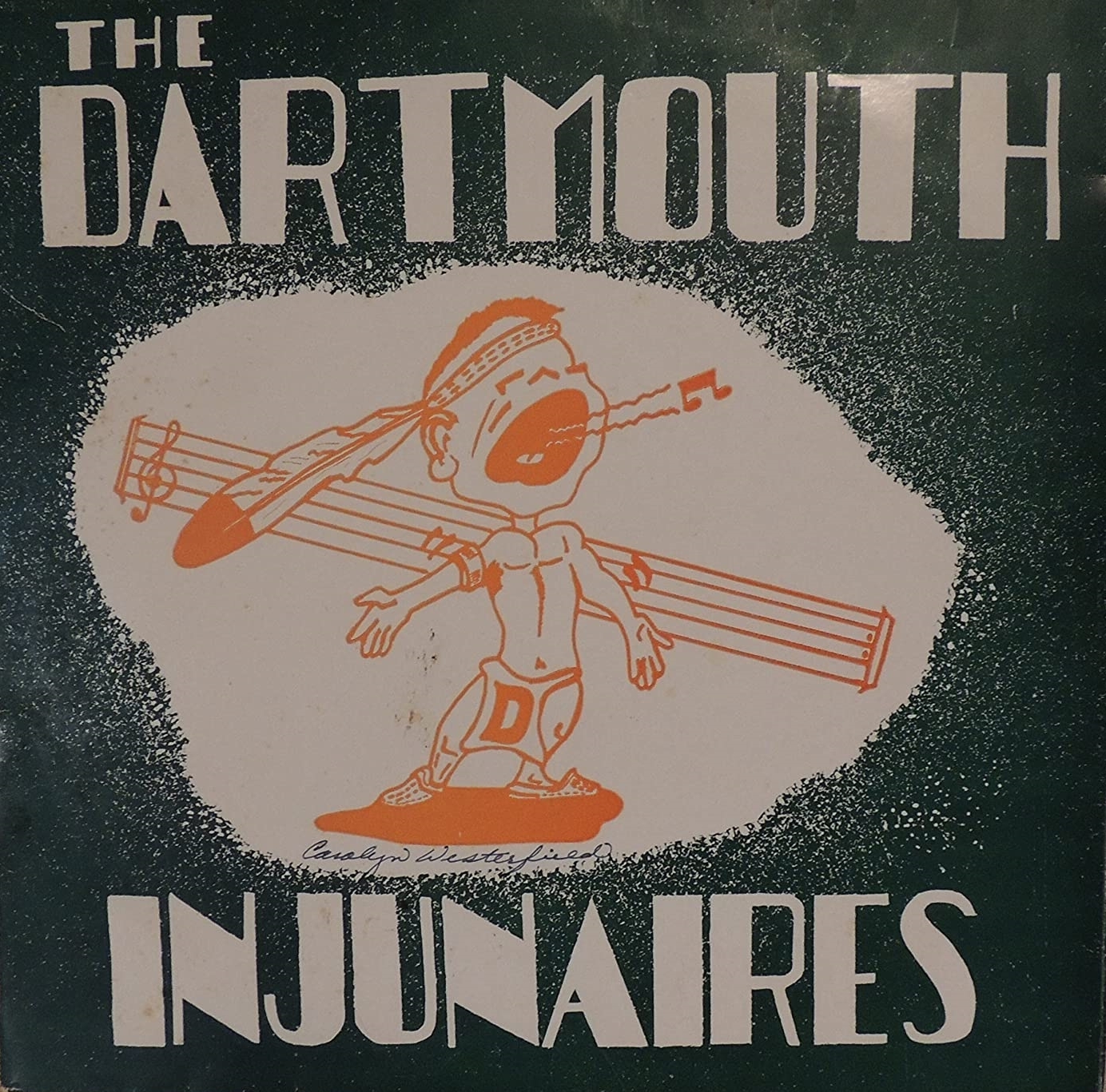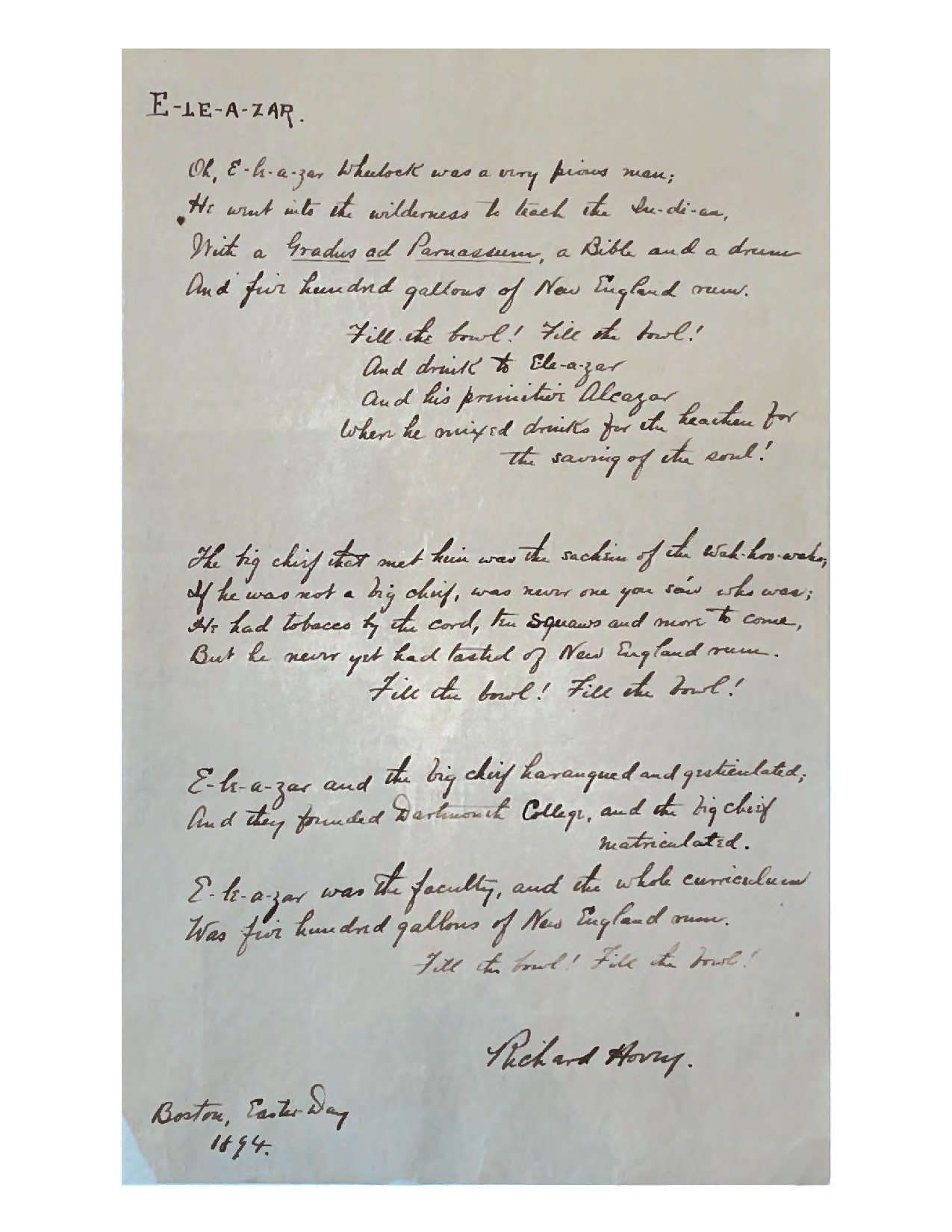Eleazar Wheelock and the Native American Musical Narrative
Injun (n.) – (slang) offensive term for Native Americans; synonyms: Redskin, red man.[1]
In Dartmouth’s 5032-word charter, the word “Indian” is used eight times.[2] The phrase “Indian Natives” is used three times, the same number of times this group of people is referred to as “savage.” It is not surprising that this institution, deeply intertwined with Native American culture in New England, has had a tumultuous relationship with American Indian appropriation and representation.[3]
When the Aires were first founded in 1946, they were called the Dartmouth Injunaires in what was considered a clever play on the word "injun," an outdated slur for Native Americans. It is unclear exactly when the change occurred, but today the group is just known as the Dartmouth Aires. In the academic year 2021-2022, the Aires will mark their 75th anniversary with a celebration on the Green and a public performance in front of the Irving center. Something else worth celebrating, however, is that as far as records show or people are aware, the Aires took their first member of Native American descent in this year’s audition cycle. Put differently, as white men from as far back as 1946 assemble on campus for the 75th reunion of the Aires, whether they realize it or not, they will also be witnessing the first time someone of Native American descent sings at the annual reunion of a group which has exploited his people for monetary and social gain.
To ponder that someone of Native American descent has only been part of the Aires for 1/75th of the group’s existence is incredible. How much money did the Aires make on Native American imagery or music? Should there be some sort of reparation process? And the fact that the Aires continue to use a name that was once closely tied to a derogatory slur raises other questions. In one interview, I asked whether a member of the group thought changing the name from The Injunaires to The Aires was “enough.” That is to say, can the group move on with their new name with a clear conscience, having cut all ties with the "injun" that, in my mind, still lingers on the tongue? He responded,
“I mean, whenever they did choose to change the name, they obviously kept a part of the name that was derogatory. However, I think that if… we as a group are aware of that history… I feel like the most we can do [is] be aware that that happened.”
The immediate implication of his response is evident: even the members know that the word Aires, though perhaps at one point innocent and meaningless, still carries derogatory meaning through pure osmosis. Yet, when I asked if the Aires have ever discussed this issue, especially in the context of “[being] aware that that happened” (“that” being the origin of the Aires), he admitted that the group had never formally discussed the name, nor had anyone objected to the name the Aires.
The secondary implication of his response is slightly more esoteric: though the group can be aware, the concept of internal judication ignores the impact that the name has on people in the broader community. Perhaps they should not be asking whether or not the name change was enough for themselves, but whether or not it was enough for the Native American students outside of the group. This point is only underscored by the fact that “Native American students outside of the group” defines every single Native American student at Dartmouth between 1946 and 2021 when the first one was let into the Aires’ ranks. This leads me to my final point: while we often spill ink about the people who make the music — in this case study, the Aires — there is a tendency to ignore the flip side of the coin, those who do not get to participate.
It would be unfair to frame a lack of participation as stemming completely from demand-side factors. Perhaps Native American students, even those with fantastic voices, choose to forgo the audition process. Especially in the pre-21st century era, it might be reasonable to assume that Native American students who objected to the name and imagery of the (Injun)Aires would not want to be in a group that appropriates their culture. But beyond the name and imagery of the Aires was (and still is) the music the group sang. Dartmouth Traditionals today have evolved to be ostensibly inclusive, but in the early days of the Aires, that was not the case. Consider the lyrics to a Dartmouth classic: “Eleazar Wheelock.”
“Oh, Eleazar Wheelock was a very pious man;
He went into the wilderness to teach the Indian,
With a Gradus ad Parnassum, a Bible and a drum,
And five hundred gallons of New England rum.
Fill the bowl up! Fill the bowl up!
Drink to Eleazar,
And his primitive Alcazar,
Where he mixed drinks for the heathen in the goodness of his soul.
The big chief that met him was the sachem of the Wah-hoo-wahs;
If he was not a big chief, there was never one you saw who was;
He had tobacco by the cord, ten squaws, and more to come,
But he never yet had tasted of New England rum.
Fill the bowl up! Fill the bowl up!”[4]
This song was sung for generations of Dartmouth classes.[5] Not only does it irrefutably paint Eleazar Wheelock as some sort of White Savior who brought the promise of Christianity to the Upper Valley, it also belittles the people, contributions, and humanity of the Native American population in historic Hanover. To refer to the Native American people as “heathen,” or to call the wives of these people “squaws” — which is, by the way, an offensive sexual slur for the wives of American Indians — strips the humanity from this group of people.[6] Nevertheless, performers of the song are quick to defend the highly cherished tune. One commenter on a poetry website writes:
“Eleazar Wheelock’s part in history as Founders [sic], in educating, leading generations of graduates out of their darkness and ignorance and equipping them for remarkable centuries of American innovation should not be overlooked! The verses are somewhat self-deprecating at best, and certainly not laudatory, of the Founder as it is. So skip the pander to jealous others who now seek to advance themselves with the pious shield of political correctness. Chill!”
Although we cannot be certain, given the context of the song, “leading generations of graduates out of their darkness and ignorance” can be interpreted as condescending to the Native Americans mentioned in the lyrics. Even if the commenter is referring to everyone, it still frames Eleazar Wheelock as a pious figure who was at the vanguard of “American innovation,” a dubious claim at best. Even more fascinating is this person’s interest in the self-deprecation of Eleazar Wheelock while completely ignoring the non-self-deprecation of Native Americans in the song. This comment is an excellent example of an attempt to gaslight proponents of social change: stop caring about such a trivial matter because 1) the song paints everyone in a poor light (so who cares), or 2) people who are against this song are advancing themselves through “the pious shield of political correctness.” In essence, it is a marvelous attempt to flip the script, placing serious issues of racism in music on the backburner and forcing a non-issue to take the stage. This bait-and-switch tactic becomes a serious problem when trying to promote social issues, especially those where the socially powerful are on the opposing side.
When sung in the context of a casual, fun community song, performers and audience members alike may forget the weight that such lyrics have on the Native American community. That is, everyone but the members of the Native American community themselves. So, when someone retorts by saying, “well, perhaps American Indians would have been accepted into the Injunaires if they auditioned,” I am usually inclined to reply that some of them may have objected to an activity that belittled their heritage. To this end, asking “who gets to participate” is not enough; we need to ask ourselves, “what exactly are we participating in?”


